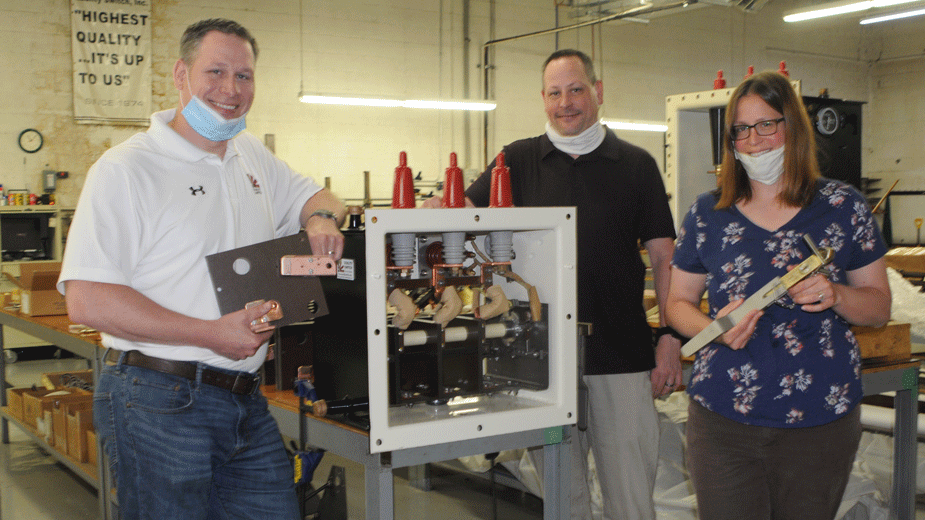YOUNGSTOWN, Ohio – Although many manufacturers were able to continue operating because they were considered essential businesses, the manufacturing sector was no less hard hit by the pandemic.
Manufacturing employment dropped by 1.3 million nationwide in April, according to the U.S. Bureau of Labor Statistics.
In Ohio, the Department of Job and Family Services reports manufacturing employment dropped 13.79% and in the Youngstown-Warren metropolitan statistical area, manufacturers shed 1,900 jobs from the month before.
Locally, those losses included 190 laid off from Brentwood Originals in Youngstown, 158 from the Things Remembered fulfillment center in North Jackson and 88 from Ohio Star Forge in Warren. VAM USA, in laying off 59 employees, cited both COVID-19 and the price war between Russia and OPEC.
In letters announcing the separations, some expressed hope that they would be temporary, while others stated they would be permanent.
Many manufacturers that the state designated as essential businesses are suppliers to essential businesses and remained open during the state-ordered shutdowns.
“The first thing we did was call our vendors to make sure we would keep getting supplies,” Quality Switch CEO Russell Sewell says.
Similarly, customers – many of whom also remained open – reached out to see if the company was operating. Quality Switch Inc., based in Newton Falls, designs and manufactures switches for transformers on utility power grids and industrial power supplies.
Business is slower than a year ago, Sewell says. Quality Switch kept all of its employees working, except for one who was sent home sick and tested positive for COVID-19 and a trainee with whom the employee was working.
Some have taken vacation days. “A lot of employees are a little apprehensive about working” because of the risk of exposure, he says. “Everything else seems to be going all right. It didn’t affect us as much as we thought.”
Quality Switch implemented social distancing and extra cleanings – even bringing in a mister to spray antiseptic on surfaces. And some older employees are working from home, Sewell says.
That includes him, at the insistence of his adult children – Jeremy and Adam Sewell and their sister, Laura Whitmore – who are involved in the business. He goes in to check on things during evenings or on the weekend, when everyone else is gone. “That was the hardest part: being away from the employees, not having the interaction,” he says.
At Butech Bliss in Salem, the early three-week stretch of the pandemic represented “the most stressful time I’ve had in business,” says vice president Matt Joing.
“We’ve learned to deal with it. We’ve learned how to handle the situation. All of our employees have a better understanding and are learning how to handle the situation,” he says.
In the early days of the pandemic, Butech Bliss assigned about 90% of its office staff to work at home and split the remaining two-thirds of its 290-person workforce into two shifts to promote social distancing, Joing says.
The company, which manufactures equipment for the metals industry, instituted temperature checks, health assessments and new cleaning protocols.
In recent weeks, Butech added the requirement that employees in the shop wear masks, which can present challenges in communication and comfort, or for situations where an employee wears a welding hood, Joing says.
As more parts of the economy reopen, he now sees a greater risk coming from an employee who brings the coronavirus into the shop.
“Regular business” is down about 20%, Joing estimates – and was down 40% in the first weeks of the shutdown.
“I’m hoping the ship is turning in the right direction. But we definitely aren’t back to normal from a business standpoint.”
Humtown Products in Leetonia, which produces conventional and 3D-printed sand cores and molds, is working back toward full employment with 20% of its employees remaining on layoff, reports president Mark Lamoncha.
The pandemic has challenged Lamoncha to look at new marketing methods that encourage customers to consider new approaches. “This is an opportunity to try new things,” he says.
As Lamoncha sees it, two viruses are spreading – the coronavirus, which is the more serious, but also the drop in oil and gas prices, which affected that industry. Large publicly traded companies are pushing their suppliers to be more competitive on pricing. “I see a lot of caution,” he says.
The economy could take a year to come back, he says. “It might come back a little quicker. But we don’t see it snapping back.”
In the MidMay issue of The Business Journal, we talked to industries throughout the area that have been hit hard by the coronavirus. Previously, we’ve talked to those operating restaurants, motor coaches and barbers and salons.
Pictured: Quality Switch leaders Jeremy and Adam Sewell and their sister, Laura Whitmore.
Related Coverage
Restaurants Try to Rebuild Customers Base
